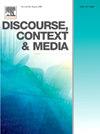How are far-right online communities using X/Twitter Spaces? Discourse, communication, sharing
IF 3.1
2区 文学
Q1 COMMUNICATION
引用次数: 0
Abstract
This paper presents the first scholarly study of the use of X/Twitter Spaces by far-right online communities. Spaces — X/Twitter’s live audio-based platform — has become an increasingly prominent tool in the far-right’s digital communication ecosystem in recent years. The popularity of Spaces with far-right users has increased in the wake of Elon Musk’s acquisition of Twitter in 2022 which signalled a marked rightward shift in the platform’s governance, particularly its techno-libertarian, ‘free speech absolutist’ approach to content moderation. Through a netnography and critical discourse analysis of (n = 41) Spaces sessions from January to July 2024, this paper critically examines how online far-right communities are using the voice-mediated affordance. In particular, this research explores the discursive practices and sharing strategies employed by individuals to propagate extreme and radical ideas, as well as to cultivate group membership, collective identity, and intersubjectivity. The findings demonstrate that Spaces are being used by a diverse range of far-right online communities and subcultures to promulgate conspiracy theories and radical and extreme ideological content. However, the findings also revealed a high degree of apolitical, non-ideological, and more everyday sharing practices. This paper broadens our empirical understanding of how Spaces are being instrumentalised by reactionary communities, and the role of voice-mediated affordances in the amplification, socialisation, recruitment, and radicalisation of far-right ideas globally.
极右翼网络社区如何使用X/Twitter空间?话语、交流、分享
本文首次对极右翼在线社区使用X/Twitter空间进行了学术研究。space——X/Twitter的实时音频平台——近年来已成为极右翼数字通信生态系统中日益突出的工具。在埃隆·马斯克(Elon Musk)于2022年收购Twitter之后,极右翼用户的空间越来越受欢迎,这标志着该平台的治理出现了明显的右倾转变,尤其是其技术自由主义、“言论自由绝对主义”的内容管理方式。通过对2024年1月至7月的(n = 41)次空间会议的网络学和批判性话语分析,本文批判性地考察了在线极右翼社区如何使用语音介导的信息。本研究特别探讨了个体在传播极端激进思想、培养群体成员、集体认同和主体间性方面所采用的话语实践和分享策略。研究结果表明,各种极右翼网络社区和亚文化正在利用这些空间来传播阴谋论和激进极端的意识形态内容。然而,调查结果也揭示了高度的非政治、非意识形态和更多的日常分享行为。本文拓宽了我们对空间如何被反动社区工具化的经验理解,以及语音介导的启示在全球极右翼思想的放大、社会化、招募和激进化中所起的作用。
本文章由计算机程序翻译,如有差异,请以英文原文为准。
求助全文
约1分钟内获得全文
求助全文

 求助内容:
求助内容: 应助结果提醒方式:
应助结果提醒方式:


